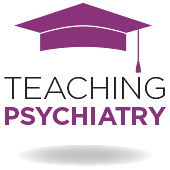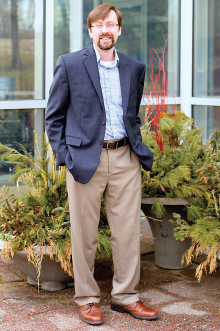Educator Cites Responsibility to Future of Patient Care
Abstract
Physician burnout is among the most challenging issues facing American medicine, affecting medical students, residents, and early career physicians. This is the sixth in a series of articles profiling psychiatrists who have made education their career.

Psychiatric education is a “road less travelled,” and many psychiatrists who have made education their careers found it on the way to other professional pursuits.
But Art Walaszek, M.D., residency training director at the University of Wisconsin Department of Psychiatry, may have been born to it. “I’ve had a longstanding interest in education that dates back to high school,” he said. “I remember working on a project in high school where I designed a computer program called ‘Teachers Aid’ to help teachers with grading. The teacher who guided me through that project recorded my presentation, which I was able to use as a tool for quickly improving my own teaching style.”
His teenage aptitude for teaching has evolved into a career that has made him recognized in the educational community as one of the most promising young leaders of psychiatric education. Today, he is president-elect of the American Association of Directors of Psychiatric Residency Training (AADPRT).
As residency training director, he oversees a program with some 30 new physicians in various stages of training. His responsibilities include classroom teaching—a geriatric psychiatrist, Walaszek takes a special interest in teaching about late-life depression and the ethics of care for older persons—along with supervision of resident clinical work and case reviews.

As president-elect of the American Association of Directors of Psychiatric Residency Training, Art Walaszek, M.D., wants to create a database of training program initiatives to address resident and physician burnout.
Walaszek said that next year the training program will expand its curriculum to include a public health track for training in rural psychiatry, the result of a state grant to expand care to the state’s large rural areas.
He is also vice chair for education and faculty development in the Department of Psychiatry, overseeing child and geriatric fellowship programs. For the last two years, Walaszek has been co-leader of the Outreach, Recruitment, and Education core of the Wisconsin Alzheimer’s Research Center (funded by the National Institute on Aging). “I do a lot of speaking to the community, including lay audiences and primary care audiences, about the diagnosis and treatment of Alzheimer’s disease and behavioral issues related to Alzheimer’s.”
Walaszek sees in education the opportunity to advance his students today, while ensuring quality care for patients they will see tomorrow.
“Residency is the final step toward becoming a psychiatrist,” he said. “As educators, we are in the position of using a brief amount of time to take graduated medical students and help them become people who will be caring for patients. I find that immensely satisfying.
“I like the creative aspect of my position,” he continued. “I was a creative writing major in college, and when I went to medical school, I vowed to keep that creative instinct alive. In my work as a residency training director, there is a tremendous opportunity to create new curricula, new ways of teaching, and new ways of assessing trainees. It’s a responsibility to trainees but also to our patients to make sure our young psychiatrists can provide excellent care. I view this role as a responsibility to society.”
Mentors Modeled Compassion, Intellectual Rigor
Mentorship has been critical to Walaszek’s evolution as a teacher. “In medical school at Northwestern, I was exposed to Cheryl Woodson, M.D., a geriatrician who led us on a project to teach others about Alzheimer’s disease,” he recalled.
It tapped into his teacher instincts, but it also lay the seeds for a future interest in treating older people. In residency at the University of Washington, Seattle, Deborah Cowley, M.D., director of residency training and vice chair for education, made a lasting impression on him. “She inspired me to become a residency training director,” Walaszek said. “As a teacher she’s patient, thoughtful, and very committed—that’s the model I’ve kept in mind for myself.”
Another formative mentor was geriatric psychiatrist Mark Snowden, M.D. “He had an effective and calm way with patients and at the same time taught us to be intellectually rigorous—applying the evidence base to our practice. I remember presenting a case to him, and he really challenged me to be very specific about the reasons for my diagnosis. Did this patient really have major depressive disorder or not? It was a valuable lesson that had implications for selecting the right treatment and making sure that patients recover.”
Walaszek has brought that intellectual rigor to his teaching and to his passion for working with older people. In his role at the Alzheimer’s Research Center, Walaszek is helping to implement a new teaching model—“academic detailing,” a term borrowed from pharmaceutical sales in which the salesperson is in the physician’s office making a pitch.
“In the traditional model of CME, knowledge transfer is pretty low, and practice change is very, very low,” he said. “In academic modeling, the teacher is right in the setting where the physician practices with challenging patients. So I go out to a clinic near Madison and see patients with their physicians, and I give advice about tests to order or interventions to try for dementia.”
It’s a version of the kind of old-school teaching Walaszek would like to bring back to medical education (and one whose passing many senior physicians lament). “In my dream world, we would return to some form of apprenticeship training, where a senior physician works closely in a clinical encounter with learners,” he said.
Tackling Physician Burnout Is a Priority
When asked about the greatest challenges facing medical education, Walaszek cited the factors every teacher will understand—time and funding. “I live in a state where the university system’s funding has been cut by $250 million,” he said. “So we’re being asked to teach more with less.”
That leads to stress at all levels of the system, and for the individual trainee and physician, a problem that is one of the most troubling in contemporary medicine: physician burnout.
“Some of this has been going on for a long time, but it’s really escalating,” he said. “It affects medical students, gets worse in residency, and persists into physicians’ early career phase. People are retiring earlier, and that puts so much pressure on our junior faculty, on whom we rely so heavily for training. This is a huge challenge for our field.”
As president-elect of AADPRT, it’s a problem Walaszek wants to tackle. He hopes to aggregate efforts by residency programs to address burnout—at Wisconsin, training programs have experimented with mindfulness meditation, among other initiatives—to compare efforts and create something like a “best practices” database. His other priority is faculty development and ways to relieve stress on junior faculty.
Despite the mounting challenges, Walaszek said he wouldn’t trade his job. “I’ve heard it said, and I agree, that the best job in academic medicine is being a residency training director. I get to work with lots of eager faculty helping to ensure that the patients being treated by the next generation of psychiatrists are receiving outstanding, high-quality care.” ■



